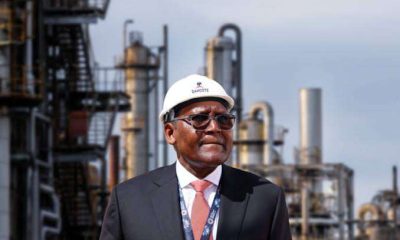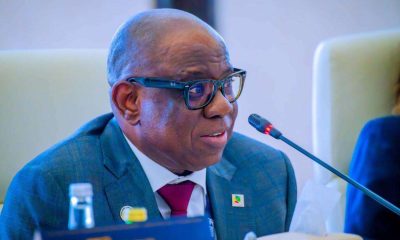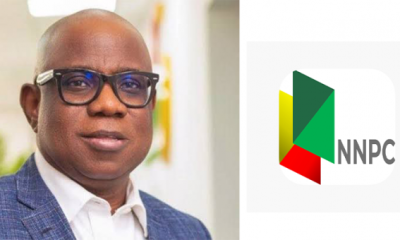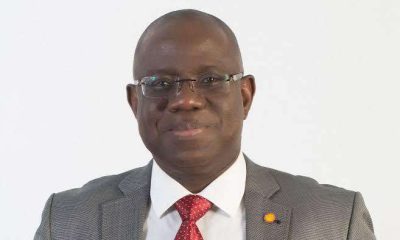Business
Confusion trails FG-Dangote Refinery ‘naira for crude’ deal

…as Nigerians groan over high fuel price, scarcity
The supply of crude oil in naira to the Dangote Petroleum Refinery and other local modular plants by the Nigerian National Petroleum Company Limited (NNPCL) appears deep in confusion, as the special arrangement has failed to positively impact the nation’s downstream petroleum sector as expected, Business Hallmark can report.
About two weeks into the commencement of the much anticipated deal, which began on October 1, 2024, the nation’s downstream petroleum sector is in a shock.
While fuel prices have continued to rise despite hope of millions of Nigerians that the arrangement will bring a crash in the pump price of the commodity, fuel queues have resurfaced in several towns and cities across the country, dampening the hope and expectations of many people, who had put hope in the arrangement.
It would be recalled that the Federal Executive Council (FEC) had on July 29, 2024, approved a proposal by President Bola Tinubu directing the Nigerian National Petroleum Company (NNPC) Limited to sell crude oil to Dangote Refinery and other local ones in naira.
To ensure the smooth implementation of President Tinubu’s directive to sell crude to local refineries in naira, the Federal Government inaugurated a technical subcommittee on August 15.
The presidential committee, made up of several bodies and agencies, including the Federal Inland Revenue Service (FIRS), Federal Ministry of Finance, Nigerian Ports Authority (NPA), NNPCL, Nigerian Midstream and Downstream Petroleum Regulatory Authority (NMDPRA), African Export-Import Bank (Afreximbank), Central Bank of Nigeria (CBN), Nigerian Upstream Petroleum Regulatory Commission (NUPRC), announced on August 19 that naira payments for crude oil sales to Dangote Refinery will commence on October 1, 2024.
And on Monday, October 7, 2024, the government, through the Minister of Finance and Coordinating Minister of the Economy, Wale Edun, announced that it had officially commenced the sales of crude oil and refined petroleum products in naira.
BH reliably gathered that the deal, which involves the delivery of up to 400,000 barrels of crude oil daily to the Dangote refinery in naira is to last for six months in the first instance, pending a further review by the technical sub-committee on domestic sales of crude oil in local currency.
However, despite the initial fanfare that trailed the initiative, Nigerians are yet to feel the impact.
BH findings revealed that the initiative is currently dogged by several bottlenecks and controversies, which upended previous interventions.
One of the bottlenecks threatening the initiative, BH learnt, is the non supply of the exact quantity of crude to the mammoth Dangote refinery by NNPCL as agreed.
Industry sources, who spoke on the matter, said expecting Dangote to get 12 million barrels of crude oil daily from NNPCL is a pipe dream, as the corporation is currently not in a position to fulfil the 400,000 barrels per day the Federal Government had mandated it to supply to the refinery.
Based on the 400,000 daily crude supply contract, NNPCL is expected to supply 12 cargoes to Dangote refinery on a monthly basis. A cargo is made up of 1million barrels.
However, it was learnt at the weekend that shipments over the next two months may not be delivered as planned.
“NNPCL currently don’t have the capacity to give Dangote 400,000 barrels of crude. Where will it get it from? Except the government forces oil companies, particularly International Oil Companies (IOCs) to be part of the deal, the target, I believe, is presently unachievable.
“For instance, October’s list includes two cargoes (2 million barrels) that were not supplied in September.
“Nigeria currently exports about 50 cargoes (50 million barrels a month. NNPCL’s share of this is 55 percent, which is 27.5milion barrels.
“The rest, about 45 percent on average, belongs to both IOCs and indigenous oil companies, which operate marginal fields.
“The naira for crude arrangement will take 13 to 14 shipments from Nigeria’s monthly production output, which NNPCL don’t currently have, as it had mortgaged a substantial percentage of its own share of the black gold through ‘cash for crude’ deals”, a source familiar with the matter informed our correspondent.
Some energy experts also argue that the naira for crude deal will substantially decrease Nigeria’s crude exports, and in essence the foreign exchange normally gotten from crude exports.
“The West African crude market is set to be substantially tighter in the fourth quarter of 2024, because of the supply to Dangote.
“The volumes could even send Nigerian exports below one million barrels a day”, said Ronan Hodgson, a London-based analyst at FGE.
Though the coming on board of Dangote Refinery, apart from earning the nation huge foreign exchange of about $25 billion annually, is expected to stabilize the naira as Nigeria will be saving about 40 percent of its FX earnings, which it currently spends on the importation of refined petroleum products.
Experts argue that the refinery’s full benefits won’t be realized until it reaches full capacity and starts to export its excess products.
Based on BH findings, Nigeria, until recently, spends $600million monthly ($7.2 bilion annually) to import the estimated 60 to 65 million litres of petrol it consumes daily.
“With the commencement of operations of Dangote Refinery, the nation will be saving the monthly $600million petrol importation cost, when the plant reaches full capacity and will start earning foreign exchange, when it starts exporting its excess products, which is about 40 to 45 percent of its output.
“We expect the savings from import bills and earnings from exporting Dangote Refinery to be huge, as the current fuel consumption figure of $60 to 65 millions daily is farfetched.
“A large chunk of the purported fuel imported into Nigeria don’t actually reach the shores of the country. And the little that gets into the country, most of it are smuggled outside the country to neighbouring countries.
“Nigeria’s actual daily fuel consumption figure can’t be more than 25 to 30 million litres at most. So, if there is no more fuel importation, the nation will be saving a lot from the opaque and largely fraudulent fuel importation and subsidy schemes”, said Dr. Peju Berkley, an oil and gas expert.
Meanwhile, the shoddy implementation of the ‘naira for crude’ scheme, has thrown the nation’s already stressed oil industry into further turmoil.
Checks by BH indicated that petrol scarcity has resurfaced across the country, especially in major cities of Abuja, Lagos, Ibadan, Port Harcourt, Ogun, Kano and Awka.
The situation, our correspondent learnt, is caused by NNPCL’s sudden withdrawal from the products buy back deal with Dangote, which before now have the corporation as the sole off-taker and distributor of the plant’s gasoline.
The Federal Government had last Friday, October 11, announced that marketers can now purchase petrol directly from Dangote refinery.
While making the announcement in Abuja at the weekend, the Minister of Finance and Coordinating Minister of the Economy, Wale Edun, said that NNPCL had ended its exclusive purchase agreement with Dangote Refinery, opening up the market for other marketers to buy petrol directly from the refinery.
According to Edun, the direct purchasing mechanism allows marketers to negotiate commercial terms directly with the refineries, fostering a more competitive market environment and enabling a smoother supply chain for petroleum products.
“The most significant change under the new regime is that petroleum product marketers can now purchase petrol directly from local refineries.
“This marks a departure from the previous arrangement where the NNPCL served as the sole purchaser and distributor of PMS from the refineries.
“With the commencement of local petrol production, the market is better equipped to support these direct transactions.
“This transition is expected to enhance efficiency in product availability and stabilize market conditions for the benefit of all Nigerians.
“We are committed to providing clarity on this development and will continue to engage with stakeholders to ensure a seamless transition process”, the minister stated in a statement.
However, while reacting to the minister’s statement, fuel marketers told BH they were yet to start the direct purchase of petrol from Dangote refinery despite NNPC’s abrupt withdrawal from its fuel deal with Dangote.
“It is not true that major marketers have started lifting PMS from the Dangote refinery. Rather, we were made to understand that the directive to start buying directly from the plant was given on (last) Tuesday.
“However, as of today, Dangote has not come up with any price. The main thing is that it is now official that marketers can now approach the refinery and buy petrol.
“The truth is that NNPCL is not ready to buy the product again at a subsidized cost for marketers. That is the implication of what has happened, which means that petrol subsidy has been removed completely”, the official explained.
Also speaking, a top director in a major oil marketing company, who did not want his identity revealed, said marketers expect to start buying petrol directly from Dangote from this week.
“I am not sure yet if some marketers have started loading directly from the plant. Maybe that will start next week (this week) because as of now, all that has happened is that we heard that NNPCL will no longer be the sole off-taker from the Dangote refinery.
“The last cargo we bought was through NNPCL. Maybe the next time we go, they will tell us that we have to go to the Dangote refinery directly. These things take a bit of time. People shouldn’t be in too much of a hurry. I am sure by next week things will be clearer”, he assured.
But the decision of the NNPCL to suddenly stop being the sole off-taker and distributor of Dangote’s petrol has disrupted the supply chain, with many fuel stations across the country not having fuel.
Owing to the scarcity, a litre of petrol, apart from NNPC stations and major outlets like Mobil, MRS, and Total, which sold for between N998 to N1,100 in Lagos and environs at the weekend, climbed to between N1,150 and N1, 300 in stations owned by independent marketers.
The situation is worse in other states, especially in the East, South South and the North, where motorists buy a litre of petrol for as much as N1,500.
A manager of a filling station, which sold fuel to motorists on Saturday at N1,200 per litre, blamed the hike in price on NNPC.
“NNPCL was shoddy in the way it managed the process of exiting the deal with Dangote. The corporation can’t just announce on Tuesday that it would no longer be the sole buyer and seller of Dangote’s PMS and direct marketers to Dangote for future purchases.
“We all know that trade negotiations can be tricky and exhaustive. Even NNPCL, it took it almost a month of forth and back with Dangote officials to get an agreeable price.
“It is the effects of their shoddiness Nigerians are currently facing. They can’t just withdraw like that without making necessary arrangements, and expecting that there will be no shocks”, the manager noted.










